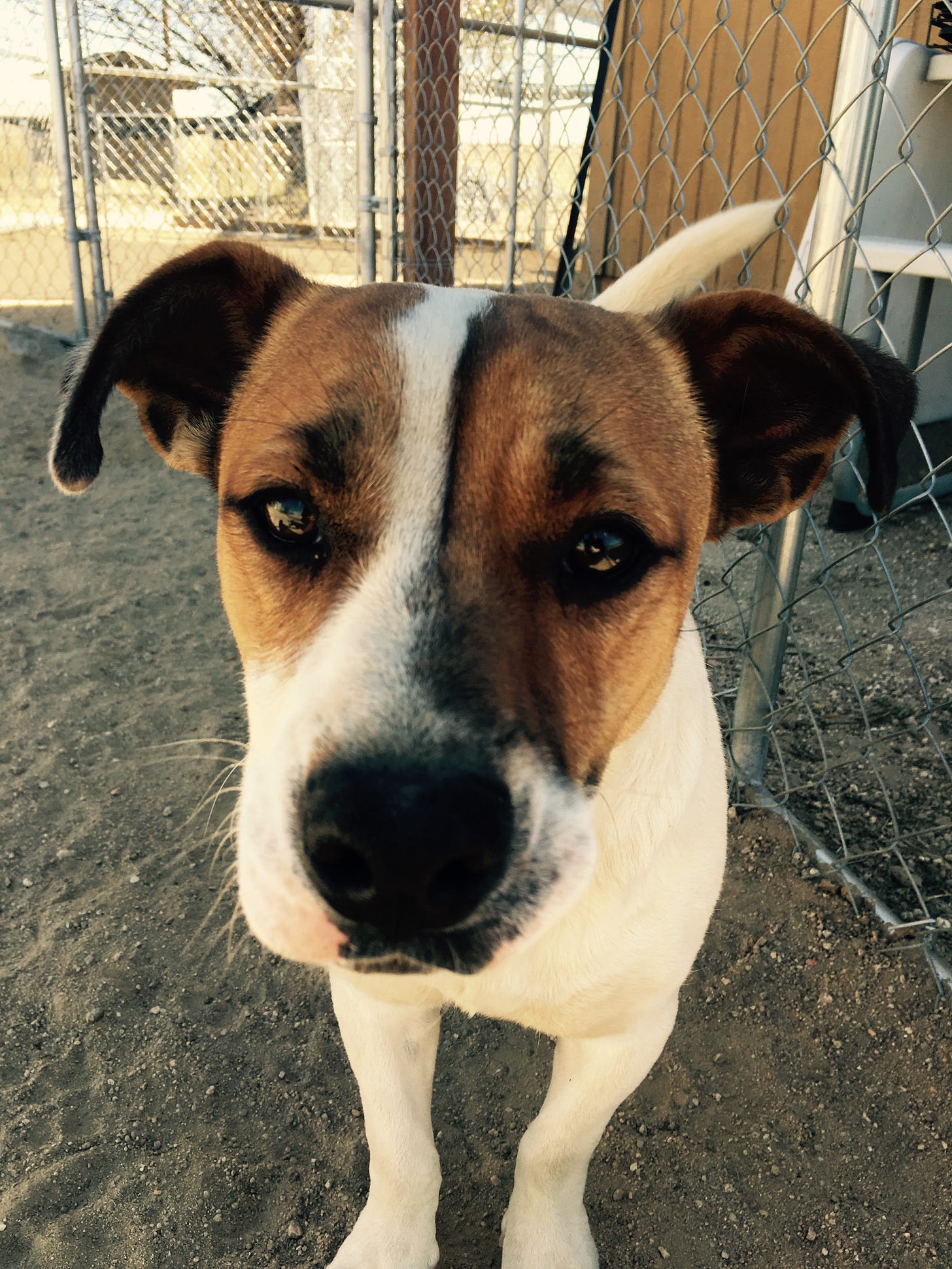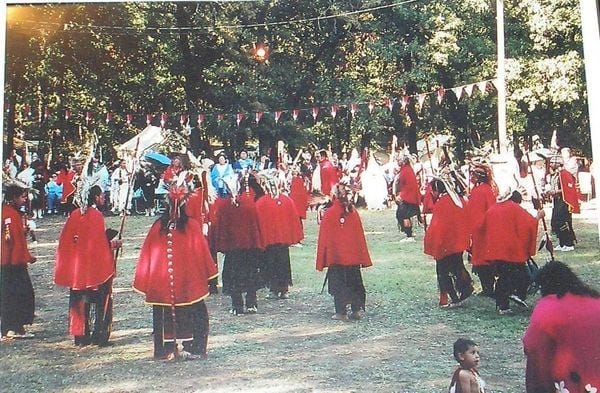In October 2016, in a quiet moment at my kitchen counter, I unknowingly swiped my way to meeting my soulmate. Pajama-clad in my little second-floor condo’s kitchen, scrolling on my phone, mindlessly eating some snack or another. Michael and I had ended our relationship several months before.1 While my heart felt close to broken, it was mending, and there had just been enough space created for a new love to enter. Frustrated with the mindless banter, cheesy pickup lines, and half-hearted attempts to be clever, I switched from app to app, closing each one worse for the wear. Then I opened the one I’d visited here and there—a site that sought to match available dogs with potential adopters.
There he was, his little brown face, a river of white tracing his forehead, stubby little legs, and eyes that said “I’ll save you, but you’ll be terrified of how hard you fall for me.” “Dawg Dawg” it read, “Jack Russell and Basset Hound mix.” That night, I went to sleep with a deep certainty that I’d just seen my truest soulmate—and I had to meet him. Jeffrey2 (formerly Dawg Dawg) was at Painted Paws for Veterans. When I arrived at the ranch to meet Jeffrey, I asked Ty “So how does the selection process go?” without missing a beat he said, “This isn’t about choosing a dog, the two of you must choose each other.” And so we did.
If you’ve followed along, you know I’ve been raising money for Painted Paws for Veterans this year for my birthday. My goal is to raise $1,000. We’ve got about $600 to go! Each month, PPFV spends well of $10k just on food and necessities for the dogs in their care at the sanctuary. That’s outside of any emergency rescues they may take on.
Jeffrey’s story brought me here, but what I’ve learned about Painted Paws is much bigger than my bond with him. To give you a glimpse into the heart of this sanctuary, I spoke with its founder, Ty Warrick, who generously answered some of my most pressing questions about our furry companions and their healing power.
Interview with Ty Warrick, Founder of Painted Paws for Veterans
1. Can you share a bit about you and Sara, both in and out of your work with Painted Paws?
I am retired military with 20 plus years in the medical field. Sara is a retired accountant. We are both Master Herbalist and Clinical Aromatherapist.
2. What’s the story behind Painted Paws for Veterans? Has the mission evolved over time, or have there been any key turning points?
My little dog saved my life after I deployed home. My final orders in the uniform.
Our mission, while it remains the same with helping Disabled Veterans find a companion to assist them with learning to overcome new challenges and live again, has evolved with the reality of homelessness and mental health/behavioral challenges we all must face someday. Our outreach program for homeless animals with Veterans and our community is a reality that our sanctuary will never be empty because our society and laws fail to help prevent the overpopulation of both species.
3. You use the term "sanctuary" instead of more typical phrases like "rescue" or "rehabilitation." That feels intentional—can you explain why this word captures the heart of your work so well?
Because a sanctuary is about a forever home regardless of adoption. It’s a place for the unwanted to have a place they can feel safe and know they are loved regardless of their challenges.
4. It’s widely understood that animals, especially dogs, have a big impact on our mental health. From your perspective, what truths stand out about the connection between humans and animals?
PTSD is a forever disease. It is not only about anger. It carries a huge amount of depression and anxiety. Canines, cats too, allow a person to communicate without words. The impact of needing silence without being alone. On the flip side, many canines suffer the same struggles. They will lean on a person even if they do not wish to be touched. The connection is much deeper and an unspoken understanding of past pain and sadness.
They also allow someone with PTSD to work through their struggles. Learning how to touch again after the war and feel emotions over being able to allow themselves to be loved or needed. To be connected to life. The same is true for canines. Once discarded and abandoned, they learn how to trust and love again.
Having two souls work together to rebuild trust and love is an amazing accomplishment. Restoring their ability to feel again.
5. Okay, let’s get a little woo-woo! What do you think dogs really are—guides, spirits wrapped in fur, little pieces of the Divine, reincarnated souls, or something else entirely?
Something else entirely. Canines have the ability to teach us what really matters in life. What do you need? What makes us happy? The true meaning of Unconditional love. As humans, we tend to complicate love and value. Fail to be loyal and often close our hearts to what we do not want to hear or see.
6. Let’s dive deeper into the woo: Tell us about the souls of dogs. Why does caring for them feel like such a soul-level connection? How has your experience as a Shaman shaped your view on this?
As a Shaman of the earth, I’ve learned how much life there is here with us. What does it mean when you say, “the living”? Each canine has a different spirit for life. The ability to help a person connect and truly understand what living really is. A simple playful chase of a butterfly, or stomp in the mud. They carry the spirit of the child in all of us. Regardless of age, they still love to play. The silly heart. As humans age, we forget to enjoy the little things that made us in life. Even if now, it seems silly, it brings a smile to your face. The heart and mind connect to that moment of happiness. So, when I hear, “Dogs only live in the moment,” my reply is, “It’s because they remember who they are.” A series of moments that shape them into who they are.
7. You prioritize care for senior and disabled pups. What do you wish more people understood about these vulnerable companions?
Seniors and disabled dogs are not so different than a disabled war veteran/person. Senior dogs are like our human elders. Often forgotten or tossed aside for something selfish. Disabled Dogs, like Disabled Veterans, they had/have no control over their challenges yet must learn how to navigate through life with their disabilities or new challenges while facing the prejudices of our human society.
8. This might be the toughest one—what do you think is the single most important thing we can do as humans? Especially when it comes to our relationship with animals.
Open your eyes without closing them and turning away from their needs. You are their voice!
9. Is there a question I didn’t ask that you wish I had? Or something important you'd like people to know about your work or the pups in your care?
Do you have any regrets about starting a canine sanctuary? No. Regardless of how hard this life is knowing we can’t save them all, at the end of the day, our hearts are filled with the ones we did and tried to save. Whether it was for one hour, a day or years, “they didn’t die alone wounded on a battlefield”.
Living with PTSD is like being wounded and left alone to die after a lifetime of service and loyalty. There’s no doubt, that’s how these senior canines feel when left to die alone in a shelter. They are wounded and left to die alone after being abandoned. That is how many War Veterans feel after their service.
There is still time to donate to my birthday fundraiser. I’ll be collecting money through the end of the month, with the goal of reaching $1,000. If you know the love of a canine, have been fortunate enough to earn the love of a senior pup, or have watched someone be healed by a furry companion, you know why this work matters.
A deep, deep bow of gratitude to Ty and Sara Warrick, not only for their willingness to contribute to this week’s Sated Soul post but for their dedication to the sanctuary of our canine brethren and the betterment of our world.
What a gift endings, pauses, and breaks can be. A few short months later, Michael returned to my life (and entered Jeffrey’s for the first time) and they fell in love immediately. Jeffrey modeled for us both what it meant to start fresh: clean heart, open heart, whole heart.
Did you know that Jeffrey is named after Ina Garten’s husband?








